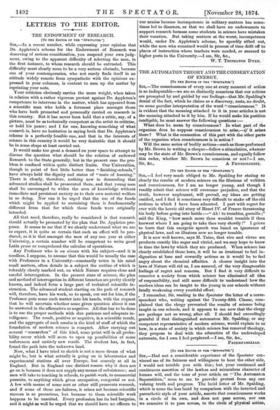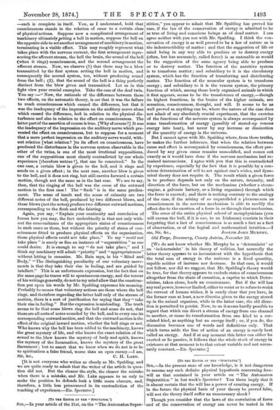[TO THE EDITOR OF THE SPECTATOR"]
SIR,—Had not a considerable experience of the Spectator con- vinced me of its fairness and willingness to hear the other side, I would not trouble you with this ; but your continued and continuous assertion of the lawless and miraculous character of human will, and the tone of your article on "The Automaton Superstition," seem to me to provoke protest from any one valuing truth and progress. The lucid letter of Mr. Spalding, which is none the less lucid by comparison with the inverted and parenthetic style of your article, asserts that consciousness works in a circle of ita own, and does not pass across, nor can we conceive it to pass across, to the circle of physical action,
--each is complete in itself. You, as I understand, hold that consciousness stands in the relation of cause to a certain class of physical actions. Suppose now a complicated arrangement of machinery ultimately petting a bell in motion, suppose the bell on the opposite side to set another arrangement of machinery in motion, terminating in a visible effect. This may roughly represent what takes place with the nervous current, the first arrangement repre- senting the afferent stream, the bell the brain, the sound of the bell (when it rings) consciousness, and the second arrangement the efferent stream. Now, we observe (1) that there may be a blow transmitted by the first system setting the bell in motion, and consequently the second system, too, without producing sound from the bell ; (2), that the sound of the bell is a thing perfectly distinct from the blow given and transmitted. Let us in this light view your crucial examples. Take the case of the deaf twin. You say :—" Now, the rationale of the difference between these two effects, on the automatic theory, is not that it was the failure to reach consciousness which caused the difference, but that it was the inadequacy of the impression on the auditory nerve alone which caused the difference, both in relation to the physical dis- turbance and also in relation to the effect on consciousness. The latter partof the assertion of course is true. [Why of course?] It was the inadequacy of the impression on the auditory nerve which pre- vented the effect on consciousness, but to suppose for a moment that a more perfect impression on the auditory nerve would, with- out relation [what relation? ]to its effect on consciousness, have produced the disturbance in the nervous system observable in the other of the twins, is one of the most irrational suppositions, one of the suppositions most clearly contradicted by our whole experience [therefore untrue ?], that can be conceived." In the one case, a certain blow is given to the bell, and it rings and sends on a given effect ; in the next case, another blow is given to the bell, and it does not ring, but still carries forward a certain motion, though not the same as in the last case. We are to say, then, that the ringing of the bell was the cause of the outward motion in the first easel The "flush" is in the same predica- ment. The sense of insult and the sense of calamity are two different notes of the bell, produced by two different blows, and these blows (not the notes)produce two different outward motions, corresponding to the flush and tire fainting.
Again, you say, "Explain your continuity and correlation of forces how you may, the fact undoubtedly is that not only with- out the concomitance of the appropriate states of consciousness in such cases as these, but without the priority of states of con- sciousness fitted to produce physical effects on the organisation, those physical effects could not take place." To say "could not take place" is surely as fine an instance of " superstition " as one could desire. It is enough to say "do not take place," and I think-my machinery will admit "priority" and "appropriateness" without letting in causation. Mr. Bain says, in his "Mind and Body," "The distinguishing peculiarity of our voluntary move- ments is that they take their rise in feeling, and are guided by intellect." This is an unfortunate expression, but the fact that on the same page he traces will to spontaneous energy, and the tenotr of his writings generally, do not to my mind allow that the construc- tion put upon his words by Mr. Spalding expresses his meaning. Probably he means that voluntary actions are those where the bell rings, and therefore regarding the latter half only of the stream of motion, there is a sort of justification for saying that they "tales their rise in feeling." But the expression is misleading. The truth seems to be that some blows ring the bell and some do not, that there are all sorts of notes sounded by the bell, and to every one its corresponding outward motion, and that the outward motion is the effect of the original inward motion, whether the bell rings or not. Who knows why the bell has been added to the machinery, knows the great mystery of life, and who knows the exact relation of the sound to the blow knows the mystery of body and spirit, knows the mystery of the Incarnation, knows the mystery of the great Sacrament ; but to assert that we know when we do not is to be to spiritualism a false friend, worse than an open enemy.—I am, [It is not everyone who writes as clearly as Mr. Spalding, and we are quite ready to admit that the writer of the article in ques- tion did not. But the clearer the style, the clearer the mistake when there is a mistake, and Mr. Lake appears to us only to make the position he defends look a little more obscure, and, therefore, a little less pronounced in its contradiction of the teaching of experience.—En. Spectator.]







































 Previous page
Previous page